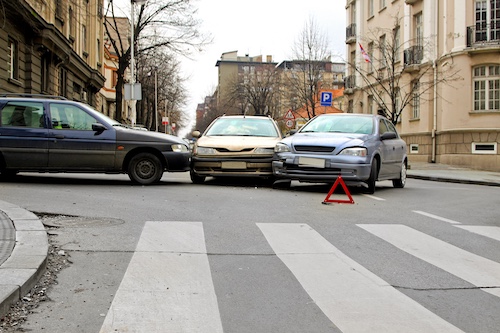Being involved in a car accident can be a stressful and overwhelming experience, especially if you’re at fault. If you’re in Georgia, the decision to file an insurance claim after causing an accident isn’t always straightforward. You may even wonder, “Should I file a claim if I’m at fault?” From understanding your insurance coverage to considering the potential impact on your premiums, there are several factors to weigh before making a move.
In this blog, we’ll guide you through filing an insurance claim as an at-fault driver in Georgia, highlighting key steps, legal considerations, and the benefits of working with an experienced Atlanta car accident attorney.
Understanding Georgia’s At-Fault System
Georgia follows an at-fault car insurance system. This means that the driver responsible for an accident is liable for the damages. If you are at fault, you may need to file a claim with your own insurance company. Your insurance will cover the costs related to the accident, including vehicle damage and medical expenses for the other party.
Responsibilities of the At-Fault Driver
As the at-fault driver, you have specific responsibilities. First, you must report the accident to your insurance company. Provide them with all relevant details, including the police report and any witness statements. This information helps your insurer assess the claim accurately.
Additionally, you may need to pay for damages caused to the other driver’s vehicle and any medical bills that arise from the accident. If your insurance coverage is not sufficient, you might face out-of-pocket expenses. Understanding these responsibilities is crucial for managing your financial obligations after an accident.
Determining Fault
Determining fault in a car accident is crucial for filing an insurance claim. In Georgia, the at-fault driver is responsible for the damages. Here are key factors that help establish fault.
Role of Police Reports and Witness Statements
After an accident, the police often arrive to create a report. This report includes essential details about the accident, such as the location, time, and any statements from drivers and witnesses. Police reports can provide a clear account of the incident and help insurance companies determine fault. Witness statements are also valuable. They can offer unbiased perspectives on what happened, which can support your claims.
Importance of Photographs and Evidence from the Accident Scene
Collecting evidence at the accident scene is vital. Take photographs of the vehicles involved, the road conditions, and any relevant traffic signs. These images can illustrate the circumstances of the accident and help clarify who was at fault. Additionally, gather any other evidence, such as skid marks or debris, which may indicate how the accident occurred. The more evidence you have, the stronger your case will be when dealing with insurance companies.
Comparative Negligence Rule
In Georgia, the modified comparative negligence rule plays a crucial role in determining how compensation is allocated after an accident. This rule allows for a fair assessment of fault among all parties involved in an accident.
Explanation of Georgia’s Modified Comparative Negligence Rule
Under Georgia’s modified comparative negligence rule, a driver can recover damages as long as they are not more than 50% at fault for the accident. If you are found to be partially at fault, your compensation will be reduced by your percentage of fault. For example, if you are in an accident and determined to be 30% at fault, you can recover 70% of the total damages awarded.
How Fault Percentage Affects Compensation
The percentage of fault assigned to each driver directly impacts the compensation received. If you are found to be 50% or more at fault, you cannot recover any damages. For instance, if the total damages amount to $100,000 and you are found to be 60% at fault, you will receive nothing. Conversely, if you are 40% at fault, you can claim $60,000 in damages. Understanding this rule is essential, as it influences whether you should file a claim and how much you may recover. Always consider consulting with an attorney for guidance on your specific situation.
Should I File a Claim If I’m At Fault?
After a car accident in Georgia, knowing how to file a claim is crucial, especially if you are at fault. Here’s a step-by-step guide to help you through the process.
Reporting the Accident to Your Insurance Company
As soon as possible after the accident, contact your insurance company to report the incident. Provide them with essential details, including the date, time, and location of the accident. Be honest about your involvement and share all relevant information. This transparency helps your insurer assess the situation accurately.
Filing a Claim with Your Own Insurance Company
When you file a claim with your own insurance company, you can seek compensation for vehicle damage and medical expenses. If you have collision coverage, your policy may cover repair costs for your vehicle, regardless of fault. Your insurer will evaluate the damage and determine the amount they will pay based on your policy limits and the actual cash value of your vehicle.
Potential Compensation from the Other Driver’s Insurance Company
If the other driver was also at fault, you might be able to file a claim with their insurance company. However, this is generally more complex. In Georgia, if you are found to be partially at fault, any compensation you receive could be reduced by your percentage of fault. For example, if you are 30% at fault and the total damages are $10,000, you may only recover $7,000.
Importance of Documentation
Keep detailed records of all communications with your insurance company. Document any repairs, medical bills, and other expenses related to the accident. This information is vital for supporting your claim and ensuring you receive fair compensation.
Consequences of Being At Fault
Being at fault in an accident can have significant consequences for your insurance coverage and finances. Understanding these impacts can help you navigate the aftermath of an accident more effectively.
Impact on Insurance Coverage and Policy Limits
When you are found at fault for an accident, your insurance company will typically cover the damages to the other party, up to your policy limits. This means that if the damages exceed your coverage limits, you may be personally responsible for the excess amount. It’s crucial to review your car insurance policy to understand your coverage and limits.
Potential Increase in Car Insurance Rates and Legal Implications
After an accident where you are at fault, you can expect your car insurance rates to rise. Insurance companies view at-fault accidents as a higher risk, which often leads to increased premiums. Additionally, if you face legal action from the other driver, you may incur legal fees and other costs.
It’s important to keep in mind that multiple at-fault accidents can lead to even higher increases in your insurance rates. In Georgia, a history of at-fault accidents may classify you as a high-risk driver, further affecting your ability to find affordable coverage.
Seeking Compensation
If you find yourself partially at fault in a car accident in Georgia, you still have options for seeking compensation. Understanding these options can help you navigate the claims process effectively.
Options for Partially At-Fault Drivers
In Georgia, if you are less than 50% at fault for the accident, you can file a claim for damages. You may seek compensation for vehicle repair costs, medical expenses, lost wages, and other related damages. This compensation can come from your insurance company or the other driver’s insurance company, depending on the circumstances of the accident.
Limitations on Compensation if Over 50% at Fault
If you are found to be 50% or more at fault, you cannot recover any damages in Georgia. This is due to the modified comparative negligence rule that the state follows. It is essential to gather evidence to support your claim and establish the degree of fault. This evidence can include police reports, witness statements, and photographs from the accident scene.
Steps to Take After an Accident
After a car accident, knowing the right steps to take is crucial, especially if you are at fault. Acting quickly and responsibly can help protect your rights and streamline the claims process.
Ensuring Safety and Contacting Emergency Services
The first priority after an accident is safety. Check yourself and others for injuries. If anyone is hurt, call 911 immediately for medical assistance. Move to a safe location if possible, away from traffic, to prevent further accidents.
Importance of Filing a Police Report and Gathering Information
Next, it is essential to file a police report. In Georgia, this is required for accidents with injuries or significant property damage. The police will document the scene, gather witness statements, and create an official report. This report can be vital for your insurance claim.
Gather information at the scene, including:
- Names and contact details of all drivers and passengers
- Insurance information from all parties involved
- License plate numbers and vehicle descriptions
- Witness contact information
- Photos of the accident scene, vehicle damage, and any relevant road conditions
Contact an Experienced Atlanta Car Accident Attorney Today!
If you’ve been involved in a car accident and are struggling to navigate the complexities of Georgia’s at-fault insurance system, don’t face it alone. At Atlanta Accident Lawyers, our experienced team is here to provide the guidance and support you need, whether you’re filing a claim, negotiating with insurance companies, or seeking fair compensation.
Contact us at 864-444-2062 for a free case review today!






